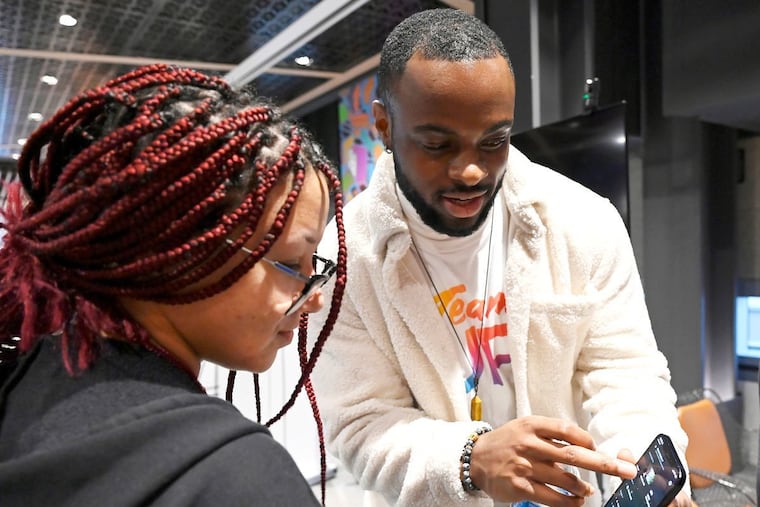Could education pipeline programs decrease Philadelphia poverty?
For 35 George Washington High School students, an exciting day outside of the classroom doubled as a career advancement opportunity.

One of the best paths out of the generational poverty that has ensnared a quarter of Philadelphians is a life-sustaining job that pays well and offers advancement opportunities. Increasingly, those jobs demand a deep digital skill set.
But that is the last thing Alam Nunez, 15, and Jhomar Rondon, 14, two shy ninth graders from George Washington High School, had on their minds as they raved about their recent trip to the Comcast Technology Center at 18th and Arch Streets.
It wasn’t the behind-the-scene tour, presentations, lunch, Comcast’s $1 million donation announcement, or even the surprise laptops they received that impressed them most.
Nunez was enthralled with the “nice view” from the 60-story tower, the tallest in Philadelphia, and Rondon thought “being out of school” and the “big white ball” (or the Universal Sphere), Comcast’s 360-degree dome theater, were the highlights.
Both students are part of a pilot pipeline program for 35 students at George Washington High School created by Heights Philadelphia, an educational nonprofit born of a 2022 merger between Steppingstone Scholars and Philadelphia Futures and run by copresidents Sara L. Wood and Sean E. Vereen.
Heights has embedded pipeline programs in 23 Philadelphia School District schools, providing one-on-one advising, academic enrichment, internship opportunities, and financial support to 3,000 students in order to increase the likelihood they will be able to get a high-quality job.
Woods, former CEO of Philadelphia Futures, calculated that once Heights is serving 5,000 students the needle will begin to move on the city’s stubborn poverty rate which has made Philadelphia the country’s poorest large city.
One of Heights Philadelphia’s biggest challenges is to keep students engaged, which requires intentional and extensive relationship building.
For the adults, that the students were engaged and curious enough to ask Comcast employees 40 minutes’ worth of questions was their indicator of success.
“You need connections and experience, and you have to believe you belong there.”
Heights Philadelphia works to connect Black, Latinx, and first-generation college students with a network of people who believe, and invest in, their talents.
“A degree or a diploma is not enough. How to get a job is not just about effort. You need connections and experience, and you have to believe you belong there,” said Vereen, former president of Steppingstone Scholars.
According to research from the Pew Research Center, Black and Latinx technology employees make up less than 10% of the country’s growing STEM workforce.
The special activities are designed to give students a real world look at different STEM careers, making their introductory computer science classes more relevant and the students less likely to abandon their studies.
Comcast also announced its $1 million donation over three years to Heights to support the pipeline program. The donation is part of Comcast’s Project UP initiative to advance digital equity.
“This program is a pipeline to economic mobility. What can you learn that you can monetize and create a career,” said Dalila Wilson-Scott, executive vice president and chief diversity officer of Comcast Corp. and president of Comcast NBCUniversal Foundation.
“Through this partnership with Heights, we will help to equip Philadelphia students with the digital skills and readiness needed to be successful and have a future of unlimited possibilities.”
Heights plans to use the money to expand its own workforce team, strengthen its career advising program in its 23 schools, and create technology credentialing and internship opportunities for high school and college students.
With 92% of jobs already requiring digital skills, Scott-Wilson said a technology skill set was no longer “a nice to have.”
“There is no time to wait to make an investment in young people,” Vereen said.